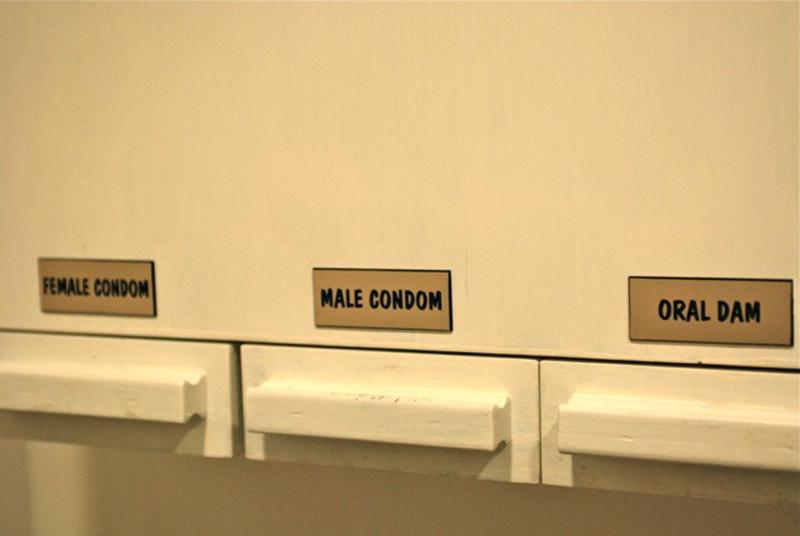Seven years after the Phi Beta Sigma fraternity began a campaign to install condom dispensers in residence halls, sexual health and safety products may soon be available in every residence hall.
Pending the residence hall governments’ approval, the funding would allow the dispensers to be installed in any campus residence hall that does not already contain them. The residence halls only need to provide $100 after approving the dispensers’ installation.
When the first dispensers were installed in 2008, Chancellor Brady Deaton required they be paid for only with hall government and RHA funds. But earlier this year, RHA secured permission for the program to be funded by the Student Health Center, Residential Life and RHA.
Residential Life Director Frankie Minor said Phi Beta Sigma, an African-American fraternity, approached residential life about providing free condoms in residence hall restrooms as part of a service project. At the time, free condoms were only available on campus during daytime hours through certain campus centers such as the Women’s Center.
“They wanted to make sure these products were available where students need them which is in the halls,” Residence Life Director Frankie Minor said.
Phi Beta Sigma made the request after reviewing data from the Center for Disease Control and Prevention, which indicated that African-American men are more likely to contract HIV. Phi Beta Sigma is part of the National Pan-Hellenic Council at MU, a coalition of traditionally African-American fraternities and sororities.
Minor said upon receiving the proposal, Residential Life began looking into feasibility, holding several meetings with students, community members and administrators, including Deaton. While some expressed concern, university research showed the majority of students supported the installation of the dispensers.
A decision was ultimately reached and approved by the Chancellor to implement a pilot program, which would install dispensers in six halls, provided that the dispensers contain products that were inclusive to varying sexual practices, were secure against vandalism and misuse and were paid for only with hall government funds. Deaton also required that research of the program be conducted to measure its effectiveness.
Heather Eastman-Mueller, coordinator of the Sexual Health and Prevention Education program, conducted this research. SHAPE is responsible for stocking the dispensers. For the three years after the first dispensers were installed, Eastman-Mueller provided surveys to 6,000 students living in halls with and without installed dispensers, asking them about their sexual habits and knowledge, including the frequency with which they had sex. Students were surveyed twice from 2008 until 2010 – once at the beginning of the school year (the pre-test) and again in March (the post-test).
“We were trying to gauge their effectiveness, and what we found is that they were effective in encouraging safer sex practices,” Eastman-Mueller said. “Respondents who lived in halls that contained dispensers were more likely to negotiate safe-sex practices with their partner than those living in halls, which did not contain them. They were also more likely to talk to their partner about using a barrier method and said they were more comfortable in doing so.”
In particular, the presence of dispensers seemed to have a strong impact on male respondents who reported significant increases in their likelihood to both use a barrier method and discuss birth control with their partner.
“The machines are really having an attitudinal effect, even beyond what I expected,” Eastman-Mueller said. “The presence of a machine is encouraging residents to have those conversations with their partner which is important.”
One concern many expressed about the installation of such dispensers is that they would encourage students to have sex and engage in higher-risk sexual practices. But the research Eastman-Mueller conducted did not support this belief.
“The results did not show that the dispensers encouraged students to have sex or engage in high-risk practices,” Eastman-Mueller said. “The presence of dispensers only encouraged those students who did decide to engage in sex to do so more safely.”
Eastman-Mueller did admit that there were several problems with the survey. She said one of the flaws was that the data was self-reported. Also, students who were in the control group, the group that did not have the dispensers in their residence hall, could gain access to the dispensers at other residence halls.
She also said that only 2.5 percent responded to both surveys and were able to be included in the data.
Still, Eastman-Mueller said she is confident in her data. She cited how the data was accepted into a research journal and presented at several conferences. She also pointed to the fact that her results were consistent with the findings of a 2010 national survey conducted by the Center for Disease Control, which found that condom distribution programs were effective in encouraging condom use. Programs that combined distribution with additional education faculties showed the greatest effectiveness.
Minor and Eastman-Mueller both expressed support for the program.
“Residential Life is in support of this initiative because it is helping to protect the safety of students,” Minor said. “We are not advocating that students be sexually active, but we know that many students choose to do so, and we want to make sure they are able to protect themselves from consequences, particularly disease. This is not an issue of sexuality but of health and safety, and we support that.”








